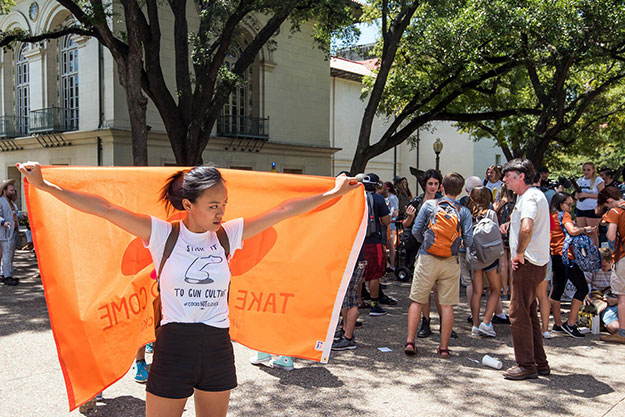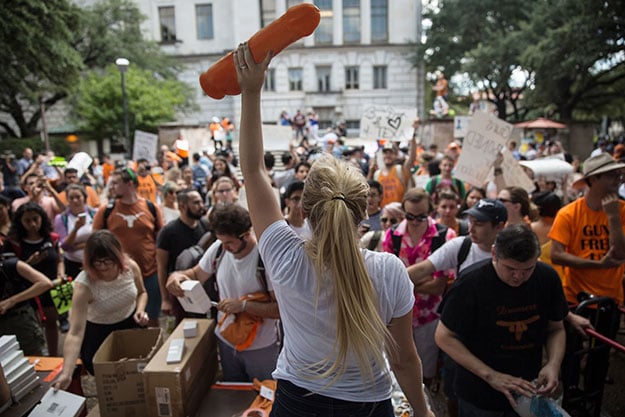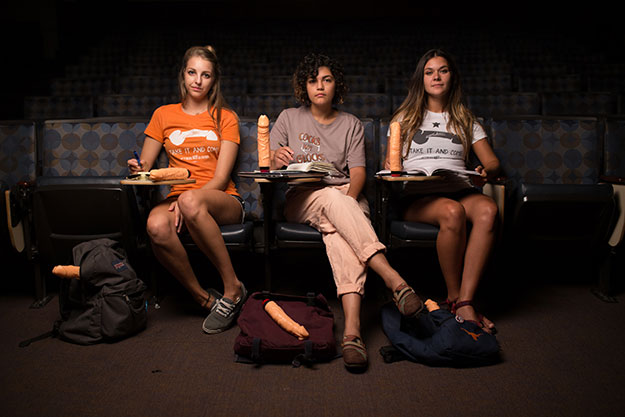SXSW Interview: PJ Raval
Explaining the gun debate to those who live outside the United States is sometimes difficult; explaining it to those inside the country can be completely hopeless. As factionalism continues to worsen—largely thanks to the depersonalization of Internet debate—finding new ways of political messaging and demonstrating seem especially pressing. PJ Raval and Ellen Spiro’s short film Come & Take It follows University of Texas at Austin grad student Jessica Jin and her work with Cocks Not Glocks, a group of demonstrators at UT who oppose open carry on campus by openly carrying dildos. (Dildos, unlike guns, are prohibited from being publicly displayed in Texas by law.) New to organizing, Jessica’s activism moves between real life and social media, drawing heated criticism from both sides of the aisle. Although the title wryly references a right-wing rallying cry, the film opens with Jessica on the verge of tears, explaining the controversy around a Facebook post to a friend.
Raval, best known for directing performance artist CHRISTEENE’s music videos and Before You Know It (a 2013 documentary about gay seniors), handles the conflicting feelings in Come & Take It with style and candor. Film Comment spoke with Raval following the premiere of Come & Take It in the Texas Shorts competition at South by Southwest about the difficulties of addressing gun violence and representing the complexities of Jessica’s story.

Photo by Marshall Tidrick
There was recently an article in The Guardian about street photography saying “street photography is dead because everyone’s just looking at their phones now.” That strikes me as reflecting a lack of imagination about how to represent the world we live in. How did you go about finding ways to visually represent the online harassment Jessica Jin experienced and the Facebook posts she made, beyond showing a shot of a screen? It is something that a lot of filmmakers and photographers and everyone has to reckon with now.
Because the story is so much centered on Jessica, who is of a millennial generation or a younger generation, I think their concept of social media is a little bit different. It’s kind of an interactive exchange rather than just something you post on. She can make one post and elicit a strong reaction and a lot of comments, and so we wanted to have something to visualize that interface that would capture the same kind of energy and spirit. That’s why a lot of the social media animations are constantly moving and there’s a background and a foreground, because there are a lot of users and different elements to it all at once. Yet even with all that kind of motion, you’re participating on it by posting something that kind of floats into the ether. It’s almost like a gigantic ocean with gigantic currents and waves in different directions and you jump right into the middle of it.
Come & Take It gets into how it is easy for teenagers and young people to make mistakes in a very public way and get raked over the coals for just trying something—mistakes that would otherwise be forgotten. The film also gets into how the actual work of changing minds is more complex than a funny protest or a sassy Facebook post. How long did you follow Jin and structure the narrative around these complexities?
We started filming from the very beginning [of her project] and that was largely because my co-director and co-producer Ellen [Spiro] is also one of the organizers of Gun Free UT, the university professor-populated organization that was challenging and opposing campus-carry. Meanwhile you have students doing the same thing, and Jessica with her brilliance of creating this Facebook post [which pointed out the irony that guns are allowed in public but dildos aren’t] brought and irreverent and absurd element to the conversation. We were following all of these different elements, but what Jessica did immediately struck us as unique and interesting because she changed the conversation and brought in the idea of gun culture being normalized yet sex culture not being normalized. And there was the fact that she’s also a young woman, and the attacks that she got, and people assuming she didn’t know her facts and didn’t understand what she was doing. It made for a really compelling story.
There were moments when she goes on her road trip where we’re not with her, but she took photos and we were able to create that sequence with the photographs which was awesome. We’re making a nonfiction film so you have to let life live itself, and in the process see where things go. We realized that when Jessica created her Facebook post there was an immediate interest in the media and it comes from a more sensationalized aspect, which makes sense because it was a very sensational way to protest. But then the question was, what happens next? We had a lot of questions because you could see that Jessica found herself now as a visible activist, and what does that mean? And what happens when you become the face of something or you create something that becomes a movement? I thought those were all interesting things to see—all the ups and downs and the joys and the heartaches that occur. And then pairing it with a kind of coming-of-age story.
I think the contradictions you’re talking about are also apparent in the contradictions that are the city of Austin, where you have a very, very liberal contingent and then you have people that are very pro-open carry. Do you feel like there is value in pointing out the contradictions of the right when there are plenty of contradictions on the left?
What’s really admirable about what Jessica has done is that she’s tried to “reach across the aisle,” and really try to understand the other side’s perspective. I think that’s something that’s really important to do because at some point, for anything to move forward, there has to be some kind of conversation—there can’t be opposition the whole way through. It doesn’t mean you have to agree with the other person. I think what Jessica’s father says is really spot on: “This is a democracy, so everyone has the right to speak.”

Parts of the pro-gun contingent are saying now that we should arm all teachers. While some people have had an experience with a great teacher who changed their life, far more people have had teachers that didn’t want to be there, would flip out over nothing, or just could not physically handle a gun. Do you feel that we’re moving toward something more meaningful even though the discourse is getting to its most ridiculous point?
When campus carry passed, no one at the university actually supported it. The chancellor did not support it, the president did not support it, and none of the deans supported it. From my understanding, they made it a statewide law and gave private institutions the option of opting out of it, and I think almost 100 percent of them opted out of it, if not all of them. So it really becomes a question of who is this law serving, why did it pass, who is actually in support of it, and is it really for the people or is it for the legislators because they have relationships with gun manufacturers because they are accepting money from the NRA. That’s really important to have: a conversation about where the root of these laws is coming from. The fact that the Parkland shooting happened and one of the students flat-out asked Marco Rubio “Will you not accept money from the NRA in your campaign?” and he couldn’t respond and say yes, that is so obvious. I think everyone has to keep calling out what they see actually happening to make effective changes to gun violence prevention.
We’re both people over 30, so we both remember a time where we saw minorities, women, and queer people’s voices be very valuable, and then saw it become a joke during the anti-PC backlash that began in the mid- to late-’90s. But now it’s becoming important again to have women, minorities, and queer people in the spotlight telling their stories. And there are rumblings of a backlash now, with guys saying, “I’m a straight white male who’s very talented, I’m not going to get a fair shake!” How do you deal with that perception at this time?
I think even just the word “privilege” has gotten a lot of attention, so I won’t lie and say that I haven’t noticed that there are certain people around me who are suddenly like, “Oh wait, do I have privilege? Is that was this concept is?” We’re seeing different cultural shifts happen. There was #MeToo, there’s Black Lives Matter, there’s trans visibility, and I think the thing that’s important is for everyone coming from some kind of marginalized group or from a group that is labeled as a minority to have a solidarity with those around you that also feel that way. For me, that’s where it gets tricky, because it doesn’t mean people of color can’t be sexist or it doesn’t mean that LGBT people can’t be racist, but hopefully we have to have these conversations where everyone has each other’s back. If there’s people who don’t fall into any of those categories, then hopefully they understand why it’s important for that solidarity to exist. And if they don’t, we should tell them.
Now is not the time to be polite or subtle. Everyone knows how crazy of a time we’re living in right now. You have to be outspoken—no one’s going to give you anything unless you ask for it. If they say no, you have to demand it until you get it. If everyone can keep reminding each other that I’ve got your back, then we can totally do that.
That’s what’s always so frustrating to me about a lot of reactions to Trump, where they’re so shocked by what he does or what he says. Ultimately what he’s saying has been the Republican Party line for many years now. Many Republicans think that immigrants come from “shithole” or “shithouse” countries, but they just say it and legislate it in different ways. Do you feel that there’s a way to push past that question of respectability and politeness?
When Trump got elected, I saw this wave of “California needs to break away” or “It’s all because of Middle America” and “who’s to blame for all of this” posts. That got me really angry because I was like, what about that queer trans kid in North Carolina? You’re just going to leave him?
The majority of black people live in the South!
Exactly. How dare you think that you can just have your little neighborhood and that’s great and not care about the rest of the United States? It was really an eye-opener. So as much as my eyes were open to the fact that yes, all the threats that we thought were there are there, and people who vote for it because they finally heard someone say these things out loud. Equally scary to me was the reaction of “Okay, well, see ya, rest of the country, I’m just going to live in my neighborhood.” I think it’s important to hear stories of someone like Jessica in Texas. It’s important to see her interact with someone who is not like her. These are the things we need to do to get the work done. The whole preaching to the choir thing—we have to expand that choir. I really admire Jessica for doing that, and I do wonder if there is someone who is sitting in California in some city that they feel is very liberal, if they realize that maybe the neighboring city is not. People really just have to be aware of this.
I’ve never fired a gun, and I have no problem saying I’m not anti-gun. I understand guns exist, and I understand people want them to hunt or for safety. But I’m very much for sensible gun laws, I’m very much for common sense in terms of who I think should have the ability or access to get a gun, and what type of gun. As I’ve been making this film, I was shocked to find out how many people have shot one, or how many people have very relaxed views about owning a gun. I wouldn’t feel comfortable having one in a car with me, I just wouldn’t. But some people are totally fine with that, and it just goes to show me that everyone has a different background, everyone has a different relationship to some of these topics. It’s important to understand the different viewpoints, and not assume everyone’s viewpoint is the same as mine because I consider myself liberal.

Photo by Marshall Tidrick
We’ve been talking about crossing the aisle and getting voices that don’t usually get heard out there. What was your collaboration with your co-director and your editor? This is very much a female-centric film—most of the people organizing these protests and the like are women.
It’s so funny, Ellen would joke and say it’s all women and PJ, our honorary woman. Honestly, it’s been great. The larger creative crew have been women, some women of color, some queer women. Solidarity among marginalized groups has to happen and I did feel like it was happening in the making of this film. I think it also helps Jessica in terms of allowing for some trust to be there that we’re going to understand her story and present it in a truthful light, and now [“not”?] take advantage of it. Hopefully anyone who sees the documentary thinks that’s true, because I think in order for Jessica to be really vulnerable on camera in front of us there had to be a certain element of trust and that trust was there. We were very careful about that.
Our editor was Victoria Chalk who I’ve worked with a lot and she did an amazing job. She herself is a young woman and I think she was able to look at the footage and think of the story from a complex way beyond the sensational and really understand how gun legislation and identity all intermingle somehow, and understand that intersectionality there. I just did a panel yesterday and that word came up, “intersectional,” and I was joking saying we’re an intersectional panel by default, because all of us are people of color and some were queer and some were women. That is the future: understanding how all of these things go into one thing. Having a crew that looks similar to the actual subjects helps immensely.
It’s not portraying them from the perspective of an outsider, but instead getting the things only insiders know, and I think the film did a very good job of that.
Thank you. I’m not a woman but I’m queer and I’ve experienced similar things—but I’m also Filipino-American, and she’s Chinese-American and I definitely thought, yes, I’m going to film her with her family because that says a lot! I’m going to see what they say. And knowing that they come from China, I thought that cultural difference between Chinese and Chinese-American would be interesting, seeing how they react to what she’s been doing.







